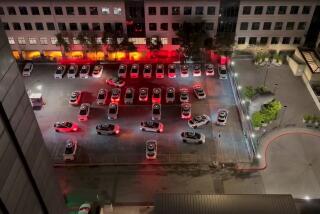Thinking Outside the Box on AutoNation Lot
- Share via
Especially at night, you couldn’t miss AutoNation.
It was an intense fluorescent glow on the 101.
It was a parking lot the size of lower Manhattan.
It was palm trees, and a series of weird structures resembling the umbrellas stuck in pineapple chunks floating on top of sweet, boozy drinks in Chinese restaurants.
It was just a year ago that AutoNation opened for business--the first mega-ultra-super car lot in Ventura County, harbinger of million-dollar sales-tax checks for cash-poor Oxnard, ground zero for no-haggle transactions in pre-owned vehicles.
Of course, there’s nothing wrong with selling cars, or, as dealers like to say, moving inventory. And there’s also nothing wrong with cities doing what they can to collect sales taxes--their main source of money for patching the streets and feeding the firefighters and doing all the other things cities are supposed to do.
But this AutoNation, with its 23 acres and 1,000 cars, this was one massive, garish, blindingly ugly car lot. It was big enough for Marine war games and bright enough to serve as a landing strip for UFOs. Even in the world of tacky Southern California freeway architecture, it stood out--truly, a site for sore eyes.
This week, AutoNation’s corporate honchos in Florida announced the company will “exit the used-vehicle megastore category.” That means closing 23 lots around the U.S., including the Oxnard store so exuberantly visible to tens of thousands of freeway motorists daily. It means laying off 1,800 employees--maybe as many as 90 in Oxnard--with Christmas just around the corner.
If I were a city official in Ventura County, this would give me the shivers, and not just because of its Yuletide timing.
It seems like just yesterday that Oxnard was as excited as a kid on Christmas Eve, knowing that AutoNation would offer those wonderful, million-dollar stocking-stuffers for years to come. After all, who could imagine a big, well-oiled company like AutoNation bailing out in a year?
But nothing is forever, especially in the upper reaches of corporate commerce. One day, the big boxes along the freeway will collapse. Shoppers will tire of them, as they tire of everything else. The vast selection of orphanage-sized packages--the 5-gallon jars of pimentos and the tube socks by the dozen--will be found to drive people insane. ThisClub and ThatCo and all the other big boxes will be emptied and shuttered--warehouses of broken dreams, of sales-tax checks that could have been.
That’s the culprit, of course. Suffocated by Proposition 13, cities must survive on sales taxes. If a small business is good, then a big box is a bonanza--even if it means slathering the strawberry fields with asphalt and putting up buildings that look like--well, big boxes.
Somewhere, there must be architects who make a terrific living designing AutoNations and big-box stores, but others are appalled.
David Sargent, an architect and urban planner in Ventura, can’t get over the oceans of tar that surround so many of them.
“It’s a question of scale,” he said, pointing out that the Wal-Mart parking lot in Oxnard is bigger than the city’s entire downtown area.
“The distance from the front door of Sam’s Club to the front door of Wal-Mart is the same as the entire length of B Street,” he said, with both wonder and woe.
Maybe someday cities won’t have to bring out the long knives to compete for these monster complexes.
Maybe they’ll share sales-tax revenues, out of neighborly concern.
Maybe Ventura will think twice about plans for a Home Depot at the old drive-in theater on Telephone Road--a full seven minutes from the Home Depot down the road in Oxnard.
And maybe Oxnard will come up with an exciting new use for the primo retail acres vacated byAutoNation.
I recommend strawberries.
Steve Chawkins can be reached at 653-7561 or by e-mail at steve.chawkins@latimes.com.







